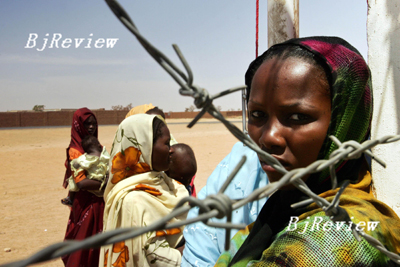
While international diplomacy focused on peacekeeping and on humanitarian efforts to save the lives of displaced and desperate people, peace in Darfur can be neither achieved nor sustained until the underlying crises of poverty, environmental degradation, declining access to water and chronic hunger are addressed.
Anyone interested in peacemaking, poverty reduction and Africa's future should read the new United Nations Environment Program (UNEP) report Sudan: Post-Conflict Environmental Assessment. This may sound like a technical report on Sudan's environment, but it is much more. It is a vivid study of how the natural environment, poverty and population growth can interact to provoke terrible human-made disasters like the violence in Darfur.
When a war erupts, as in Darfur, most policymakers look for a political explanation and a political solution. This is understandable, but it misses a basic point. By understanding the role of geography, climate and population growth in the conflict, we can find more realistic solutions than if we stick with politics alone.
Extreme poverty is a major cause, and predictor, of violence. The world's poorest places, like Darfur, are much more likely to go to war than richer places. This is not only common sense, but has been verified by studies and statistical analyses. In the UNEP's words, "There is a very strong link between land degradation, desertification and conflict in
Darfur."
Extreme poverty has several effects on conflict. First, it leads to desperation among parts of the population. Competing groups struggle to stay alive in the face of a shortage of food, water, pasture land and other basic needs. Second, the government loses legitimacy and the support of its citizens. Third, the government may be captured by one faction or another, and then use violent means to suppress rivals.
Darfur, the poorest part of a very poor country, fits that dire pattern. Livelihoods are supported by semi-nomadic livestock-rearing in the north and subsistence farming in the south. It is far from ports and international trade, lacks basic infrastructure such as roads and electricity, and is extremely arid.
It has become even drier in recent decades because of a decline in rainfall, which is probably the result, at least in part, of man-made climate change, caused mostly by energy use in rich countries.
Declining rainfall contributed directly or indirectly to crop failures, the encroachment of the desert into pasturelands, the decline of water and grassland for livestock and massive deforestation. Rapid population growth - from around 1 million in 1920 to around 7 million today - made all of this far more deadly by slashing living standards.
The result has been increasing conflict between pastoralists and farmers, and the migration of populations from the north to the south. After years of simmering conflicts, clashes broke out in 2003 between rival ethnic and political groups, and between Darfur rebels and the national government, which in turn has supported brutal militias in "scorched
earth" policies, leading to massive death and displacement.
While international diplomacy focused on peacekeeping and on humanitarian efforts to save the lives of displaced and desperate people, peace in Darfur can be neither achieved nor sustained until the underlying crises of poverty, environmental degradation, declining access to water and chronic hunger are addressed. Stationing soldiers will not pacify hungry, impoverished and desperate people.
Only with improved access to food, water, health care, schools and income-generating livelihoods can peace be achieved. The people of Darfur, Sudan's government and international development institutions should urgently search for common ground to find a path out of desperate violence through Darfur's economic development, helped and supported by the outside world.
The UNEP report, and experiences elsewhere in Africa, suggests how to promote economic development in Darfur. Both people and livestock need assured water supplies. In some areas, this can be obtained through boreholes that tap underground aquifers. In other areas, rivers or seasonal surface runoff can be used for irrigation. In still other areas, longer-distance water pipelines might be needed. In all cases, the world community will have to help pay the tab, since Sudan is too poor to bear the burden on its own.
With outside help, Darfur could increase the productivity of its livestock through improved breeds, veterinary care, collection of fodder and other strategies. A meat industry could be developed in which Darfur's pastoralists would multiply their incomes by selling whole animals, meat products, processed goods (such as leather), dairy products and more. The Middle East is a potentially lucrative nearby market. To build this export market, Darfur will need help with transport and storage, cell phone coverage, power, veterinary care and technical advice.
Social services, including health care and disease control, education and adult literacy programs should also be promoted. Living standards could be improved significantly and rapidly through low-cost targeted investments in malaria control, school feeding programs, rainwater harvesting for drinking water, mobile health clinics, and boreholes for livestock and irrigation in appropriate locations. Cell phone coverage could revolutionize communications for sparse populations in Darfur's vast territory, with major benefits for livelihoods, physical survival and the maintenance of family ties.
The only way to sustainable peace is through sustainable development. If we are to reduce the risk of war, we must help impoverished people everywhere, not only in Darfur, to meet their basic needs, protect their natural environments, and get onto the ladder of economic development.
Jeffrey Sachs is professor of economics and director of the Earth Institute at Columbia University
*Copyright: Project Syndicate, 2007. www.project-syndicate.org*"。
(The viewpoint of this article does not necessarily represent that of Beijing Reivew) | 